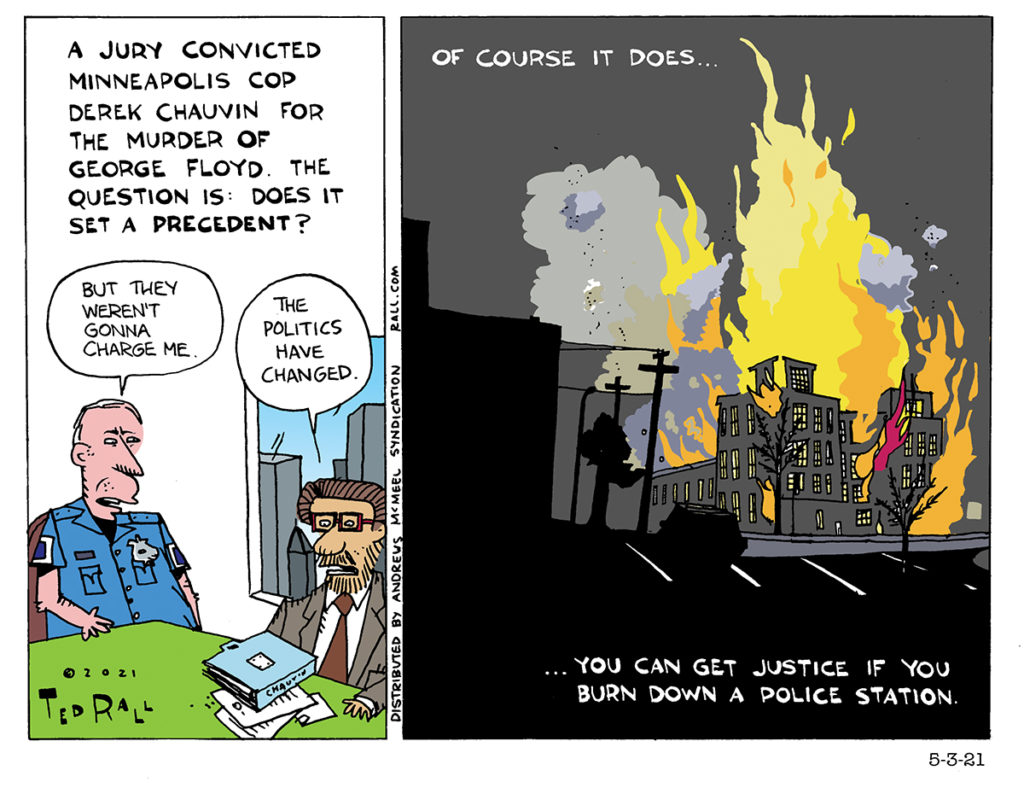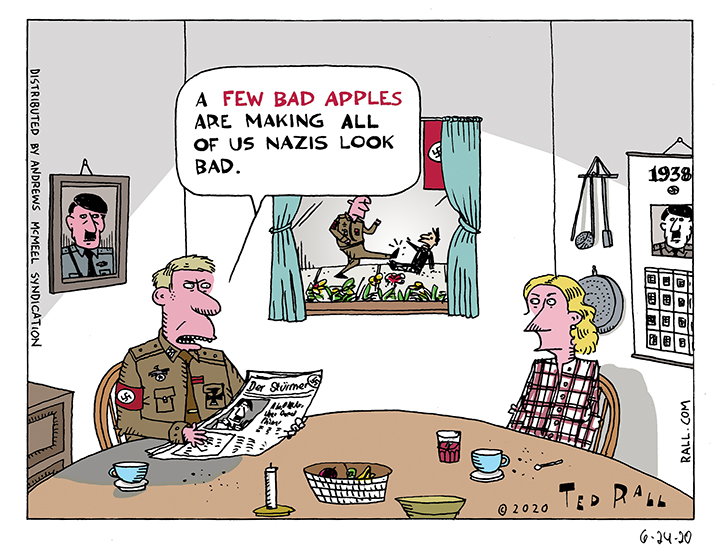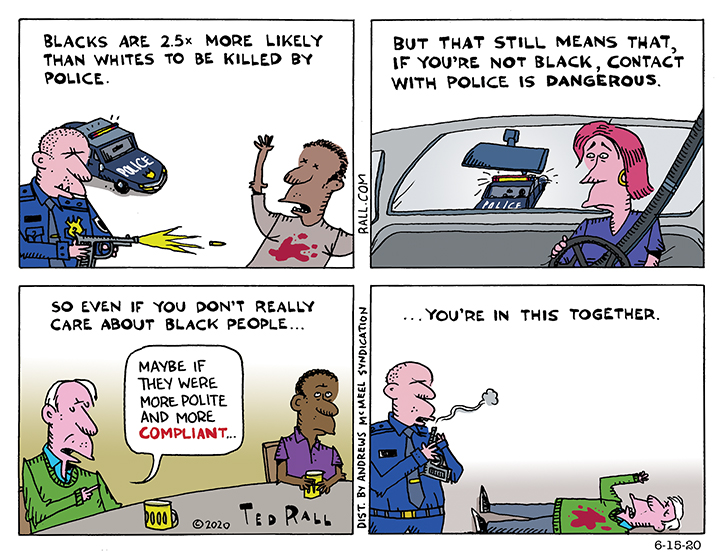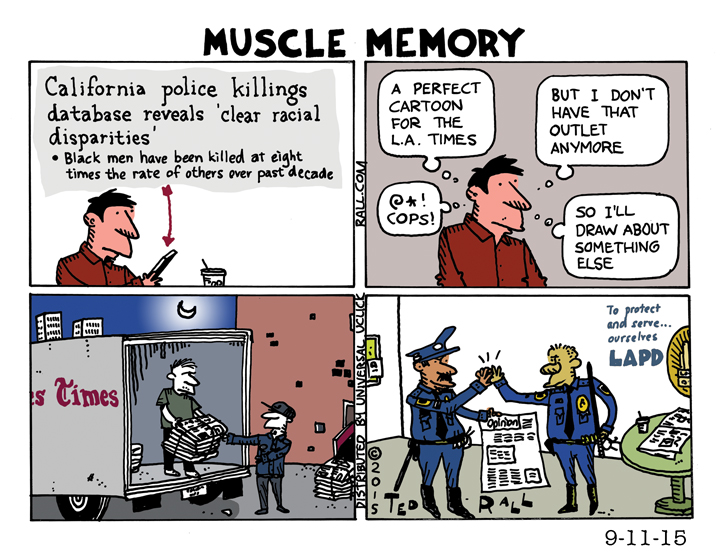
Each high-profile killing by police of an unarmed Black citizen—this week he’s Tyre Nichols, 29, of Memphis—prompts calls to reform the police. But how?
We should begin with two questions:
What is the police for, currently?
What should they be for?
Police currently fulfill two primary roles: generating revenue for local municipalities and terrorizing marginalized people.
If you’re white, middle- or upper-class, almost all your interactions with law enforcement will come in the form of a traffic stop, most likely in a small town, rather than in a big city, because big cities enjoy strong tax bases, and even more likely in a cash-strapped municipality.
Tickets for speeding and equipment violations, both of which can generate fines costing hundreds of dollars each, are by far the most common reason for a traffic stop. The Federal Reserve Bank of St. Louis conducted a fascinating study of North Carolina traffic stops which concluded that “significantly more tickets” were issued when localities experienced financial difficulties, suggesting they were “used as a revenue-generation tool rather than solely a means to increase public safety.” Some towns finance as much as 90% of their annual budgets from traffic tickets.
Defenders of the status quo will argue that the flashing disco lights in your rearview mirror enforce public safety. Indeed, motorists who speed or run red signals are a danger to themselves and others. If safer roads is the goal, however, why fine money for a moving infraction? Adding points to your license for dangerous violations, with suspension of driving privileges over a set sum, serves as ample deterrence to the wealthy and poor alike.
Only 9% of traffic stops involve suspicion of criminal activity, according to a national RAND survey of police officers.
Policing in poor and minority neighborhoods assumes the character of foreign troops patrolling hostile occupied territory. “Jump-out boys” squads like the Scorpion unit that murdered Nichols snatch people on little to no pretext, eager to rack up arrests in order to please police executives who themselves serve “tough on crime” politicians.
Cops in tough areas roust the homeless, purportedly for the “crime” of loitering but really to sweep away the unwholesome evidence of poverty that would reduce property values and street traffic to businesses if it were visible.
Police respond to countless domestic disputes—romantic relationships turned toxic, parents struggling with out-of-control children, drug abusers and their long-suffering family members, victims of schizophrenia and other untreated mental illnesses—to which a saner society would dispatch social workers and welfare case officers.
Armed cops enter homes, not to help (they can’t) but to enforce the simulacrum of peace that allows landlords to find takers for bedraggled rental properties. Recruited from the ranks of returning war veterans (who are more likely than other cops to use excessive force), jacked with steroids and trained to throw their weight around, the threat of violence is omnipresent when a uniformed officer arrives at the scene of people in emotional and psychological crisis. Shut up and calm down or we’ll lock you up/take your kid/beat you down.
What should police be doing instead?
They should make us safe. And make us feel safe.
We want cops to arrive quickly to defend us against violent people and thieves. We need them to protect us during natural disasters. We want them to provide deterrence by being present and ready to help in places where we are afraid: subway platforms, deserted city streets, public parks. But public safety is incompatible with revenue enhancement: “Police departments in cities that collect a greater share of their revenue from fees—conceivably because their governing bodies put pressure on them to generate revenue—solve violent crimes at significantly lower rates,” a recent NYU study found.
Cops should not be intimidating. They should present as friendly, polite, affable, calm, eager to help with our problems and unfailingly professional. The Nichols snuff video, in which the killer cops repeatedly shout profanities, urge one another to escalating violence and are laden with combat gear, portrays the exact opposite of what we want cops to be.
How could we get from where we are to where we want to be?
Police departments should change their training and incentive structures away from the current warrior mentality, in which cops see us as potential enemies and their main objective to return safely home every night, to a guardian mode in which their own safety is secondary, even to people suspected of lawbreaking.
We should disarm the police. Three out of four cops have never fired their weapon on the job. Among those who have, a surprisingly high proportion have done so repeatedly. In the United Kingdom and 17 other countries with unarmed policemen, being a cop is as safe a job as any other. Separate SWAT teams can respond to unusual situations like hostage standoffs.
“Three strikes” laws turn fugitives into desperados with nothing to lose. These statutes, which incentivize shooting a police officer, should be repealed.
The police should be demilitarized in every respect, including their equipment and their uniforms. When I see a NYPD officer wearing Kevlar, it conveys that he sees me and other New Yorkers as a threat rather than a taxpayer who pays his salary. Cops should lose the bulletproof vests in favor of uniforms designed to look friendly and approachable.
Use of anabolic steroids, which cause aggressive behavior, should be banned. Current recruitment policy, which favors officers hired straight from the battlefields of the Middle East, should be abolished in favor of cultural, social, class, racial and gender diversity.
No little girl or little boy dreams of becoming a cop to write speeding tickets. Municipalities should wean themselves off revenues from traffic stops but until they are able to do so, they should assign their cash-gouging duties to separate traffic enforcement agencies and speeding and red-light cameras. Free the police to focus on public safety.
Similarly, no one ever became a cop because they wanted to deal with crazy people in a psychotic crisis. Social workers and other mental health professionals should be recruited into new social-service agencies specialized in dealing with the mentally ill.
Unless we enact these and other forward-looking changes to American policing, we will continue to see promising young people like Tyre Nichols destroyed by the people paid to protect them.
(Ted Rall (Twitter: @tedrall), the political cartoonist, columnist and graphic novelist, co-hosts the left-vs-right DMZ America podcast with fellow cartoonist Scott Stantis. You can support Ted’s hard-hitting political cartoons and columns and see his work first by sponsoring his work on Patreon.)




